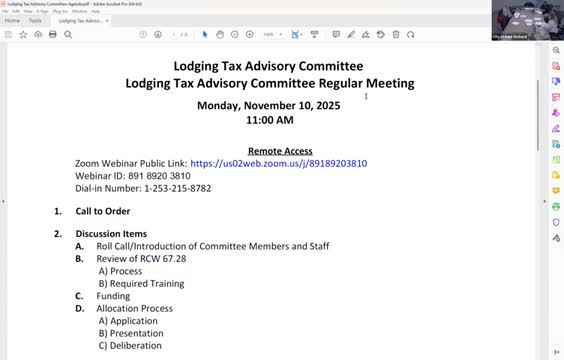Port Orchard committee reviews Open Public Meetings obligations, training and conflict rules
Get AI-powered insights, summaries, and transcripts
Subscribe
Summary
Clerk instructed new members on RCW guidance, Open Public Meetings Act requirements, training deadlines and procedures to avoid unintentional quorum; members agreed to self‑disclose conflicts and recuse when applying.
City clerk staff used the Nov. 10 meeting to brief new Lodging Tax Advisory Committee members on legal responsibilities, training requirements and conflict-of-interest procedures.
Brandy Wallace, the city clerk, reviewed state law materials in the committee packet, citing RCW provisions related to lodging-tax uses and the Open Public Meetings Act. Wallace told members appointed to the committee must complete attorney-general training on OPMA and the Public Records Act within 90 days of appointment and recommended finishing training before deliberations. “It talks about why we are recording the meeting, why I have to have a quorum,” Wallace said while highlighting legal obligations.
Wallace explained practical steps to avoid unintentional quorum under state law: staff send committee emails BCC’d to prevent groups of four meeting privately by email, and members who lack city email addresses should CC the clerk or the chair on committee-related messages so the communication becomes part of the public record. Morrissey reiterated the rule that committee members should limit informal discussions to two people so they do not trigger a quorum of four.
On conflicts of interest, Morrissey said members who apply for lodging-tax funds must self-disclose and recuse themselves from discussion and decisions related to their own application. The clerk said she will provide spreadsheets during deliberations showing applicant requests and awards historically so the committee can see side-by-side comparisons during deliberation.
Next steps: clerk will circulate training links and materials, provide historical award and reimbursement data before deliberations, and include intake and completeness guidance in the application instructions.
